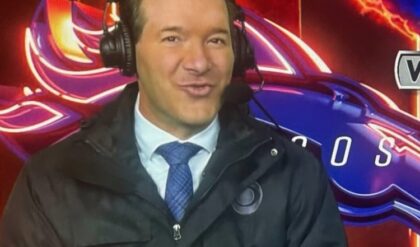She was speaking before damaging revelations emerged about the potential future first gentleman Doug Emhoff
HILLARY Clinton has warned Kamala Harris to prepare for an “October surprise” in a last-minute election twist ahead of voting in November.
Clinton was the favorite to beat Donald Trump in 2016 when, in the last month of the campaign, Wikileaks began releasing her emails and former FBI director James Comey announced he was re-opening the investigation into her use of a private server.

3
Hillary Clinton suffered an ‘October surprise’ in the last weeks of her campaignCredit: Getty

3
She warned Kamala Harris to prepare for last-minute twists and turnsCredit: Getty

3
‘October surprises’ are last-minute hitches to political campaignsCredit: Getty
The Harris campaign has today been hit with a potential “October surprise” scandal
Clinton was speaking before reports emerged Harris’ husband Doug Emhoff allegedly slapped his ex-girlfriend.
The alleged altercation took place at the Cannes Film Festival in France in May 2012.
Emhoff allegedly struck the woman, described as a prominent attorney in New York, so “hard she spun around,” according to the Daily Mail.
In a recent interview, Clinton warned Harris to expect a so-called “October surprise” – or a major, unexpected news story about a candidate – that could derail the election campaign.
“I anticipate something will happen in October, as it always does,” she told PBS.
“There will be concerted efforts to distort and pervert Kamala Harris, who she is, what she stands for, what she’s done.”
Clinton told the Harris campaign to look out for social media disinformation spread by hostile nations such as China, Iran, and Russia, as well as fabricated stories that the Trump campaign could seize upon.
“I anticipate there will be a full-court press in October,” she said. “The digital airwaves will be filled.”
Disinformation in political campaigns is nothing new, and nor are “October surprises.”
JD Vance ‘smashed’ vice presidential debate and Walz look like a ‘fool’ says expert
The term was coined in 1980 by Ronald Reagan’s campaign manager William Casey when he warned that incumbent Jimmy Carter might be planning something ahead of the November election.
But the original October surprise dates back in the 1840 presidential election, reports Politico.
President Martin Van Buren accused his opponents in the Whig Party of “stupendous and atrocious fraud” in October 1840.
Van Buren hoped that the timing of the scandal, accusing Whig officials of paying Pennsylvania voters to travel to New York and cast fraudulent ballots in state elections two years earlier, would help sway the election for him.
However, the gambit didn’t work and Van Buren’s Democratic Party lost the election to Whig William Henry Harrison.
Clinton’s October surprise began when anti-secrecy website Wikileaks began releasing hacked emails from her campaign chair John Podesta.
She faced a separate email controversy when she was found to have broken government rules by exclusively using a private server from her home while secretary of state.
Podesta claimed the Russian government was behind the hack and said that the Trump campaign had known about it in advance, something Trump’s team has always denied.
OCTOBER SURPRISES
US ELECTIONS often see a last-minute twist in the final weeks which can turn a well-organized campaign on its head. These are some of the top examples in political history.
1840: President Martin Van Buren’s campaign deliberately times the announcement of charges against his Whig opponents for mid-October. They allege that Whigs paid Pennsylvanians to travel to New York and vote fraudulently in 1838 state elections. The Whigs admit to the charges but Van Buren still loses in November,
1880: A fake letter purportedly written by Republican nominee James Garfield is published, voicing support for Chinese immigration. It comes at a time when many Chinese immigrants were moving to the US, particularly California, and anti-Chinese racism was high. Garfield wins by only 0.2 percentage points and the actual author of the letter is later arrested for fraud.
1884: Republican James G. Blaine attends a GOP meeting where a Presbyterian minister accuses Democrats of representing “rum, Romanism, and rebellion,” meaning alcohol, Catholics, and the Confederacy. Blaine claims he wasn’t paying attention, but the scandal costs him thousands of votes from the Irish, southerners, and anti-prohibitionists, and he loses.
1920: Republican Warren G. Harding’s campaign is hit by false claims that he had “Negro blood” in a racist bid to hurt his election chances. However, also in October, the Democratic ticket was hit by a sex scandal sparked by an investigation into homosexuality at a naval base. Harding wins.
1940: President FDR’s press aide knees a black police officer in the groin outside Madison Square Garden. It is the latest race scandal to hit his campaign. Days before the election, FDR promotes a black colonel to brigadier general and creates the famous African-American military pilot group the Tuskegee Airmen. He wins the election.
1964: An aide of President LBJ is arrested in a police sting for “disorderly conduct with a man,” in a sex scandal weeks before polling day. It is leaked to the RNC, but just one week later, crises in the Soviet Union and China overshadow the scandal and LBJ wins.
1968: Richard Nixon’s campaign secretly scuppers peace talks with South Vietnam by assuring them that if Nixon wins, they can expect a much better deal. The South Vietnamese withdraw three days before the election and Nixon defeats LBJ.
1972: Nixon’s Security Advisor Henry Kissinger declares that they have secured peace in Vietnam, pushing Nixon ahead in the polls. He wins a landslide, but behind the scenes, the talks have fallen apart, and the Vietnam war continues until 1975.
1980: President Jimmy Carter is struggling to free American hostages held by Iran. Just days before Americans vote, the Iranians announce they will not release them until after the election. Ronald Reagan wins. The hostages are eventually freed just minutes after the Republican completes his inaugural address in January 1981, sparking conspiracy theories Reagan made a secret deal with Iran to postpone their return.
1992: The Iran-Contra affair, in which Reagan’s administration illegally sold weapons to Iran to fund anti-communist forces in Nicaragua, had been rumbling along since 1987. Days before the election, Reagan’s former Defense Secretary is indicted. George HW Bush, Reagan’s VP, loses the election to Democrat Bill Clinton.
2000: It is revealed George W Bush was arrested for drunk-driving 24 years earlier. A strategist later claims the scandal cost Bush five states. Bush loses the popular vote but wins the election.
2004: Osama bin Laden releases a video claiming responsibility for the 9/11 attacks and calling Bush a dictator. America’s number one enemy going after the US president gives him a boost, and he comfortably wins the election.
2012: In a secret video tape, Republican Mitt Romney is caught belittling the “47% of the people” who won’t vote for him. The Obama campaign capitalizes on the scandal, and he holds the White House come November.
The scandal surrounding the potential first gentleman came after vice presidential nominee Tim Walz’s debate performance was slammed by many as “bumbling.”
The Minnesota governor appeared to mix up Iran and Israel twice and seemed to mistakenly claim he was “friends with school shooters,” during his one and only head-to-head debate with his Republican counterpart JD Vance.
Walz also swerved questions about his time in China after “lies” surrounding his past were exposed hours before the debate.
Harris’ running mate wrongly claimed he was in Hong Kong during the 1989 Tiananmen Square massacre when in fact, he was in Nebraska at the time.
Walz drew comparisons with Joe Biden’s rambling display in the debate with Trump in June this year as viewers remarked on his frequent pauses and confused looks on Tuesday evening.


